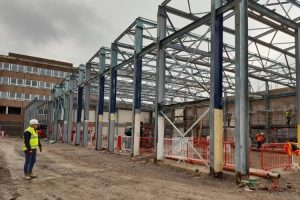As we transition to working remotely during the coronavirus pandemic, it has been critical to embrace tools such as video conferencing to keep in touch with our colleagues and business partners. This change is essential across all industries, not just construction. We have heard of teachers hosting online classes for their students, vicars leading sermons online and all sorts of clubs and activities taking place from the comfort of the participant’s living room. Video meetings help to maintain human connections, irrespective of physical location, which is incredibly important during a period of isolation.
Whilst certain industries are much more geared up and prepared for a crisis such as this, the construction industry has long been criticised for failing to take full advantage of digital technology. Will this current crisis force our industry to embrace modern methods of communication and collaboration? In this blog, Procure Partnerships Framework Director, Robbie Blackhurst discusses the positive aspects the industry can take from these challenging times…
Finding a ‘silver lining’
The coronavirus pandemic has many dark sides; we see them every day on the news. People are losing loved ones, healthcare systems are under immense strain, businesses face bankruptcy, not to mention the intense mental and emotional pressure individuals are under to balance work with family commitments. Whilst all of this is true, it can be said that it sometimes takes a crisis to make us reassess how we do things and, from the challenges, we can often find that positive opportunities will present themselves.
Last month I took a long drive to London for a meeting. Whilst it was great to physically meet my colleague, shake hands and get a coffee together, the last few weeks have made me reassess; was it really necessary? The 440-mile round trip; the 8 hours in the car; the usual frustrations over traffic; the early start and the late finish? Perhaps if we had logged onto a video conferencing call, we could have achieved the same objectives whilst also allowing time for other activities in the day? Whilst we should not dismiss the importance of physically meeting up on occasion, mixing it up with video conferencing can reap many benefits…
Reduce carbon footprints
Climate change was the hot topic of 2019 and we have all have become much more mindful of our personal and professional carbon footprints. We are living in the middle of a ‘Climate Emergency’ and the construction industry in particular is under increasing pressure to improve carbon emissions in order to achieve our Net Zero Carbon commitments. Although it is not a new concept that hosting meetings online reduces travel and in turn carbon, being forced to get to grips with the technology has hopefully made many in our industry realise that video conferencing is actually a realistic and practical alternative to meeting up face to face!
Reduce unnecessary travel expenses
A business trip often involves a night in a hotel, a meal in the evening and a train fare or petrol expenses. As we emerge from this current crisis, we will all be looking for ways to work more efficiently and maintaining our newly developed video conferencing abilities will really help with this goal. The cost to subscribe to web conferencing services is low, especially in comparison to the cost of travel, and will prevent all the additional expenses associated with travelling.
Improve employee work/life balance
Utilising remote and flexible work options such as video conferencing is said to have positive effects on employee morale, allowing us to be much more productive in our day and preventing long periods of time spent in the car or on the train. The flexibility and mobility offered by video conferencing positively contributes to employee wellbeing, less travel requirements allow for a better work/life balance and provides more time to focus on critical tasks.
After this crisis, employees will hopefully have the necessary infrastructure to allow them to work efficiently from home. This will open up the possibility of flexible working and reduce the requirement for their daily commute, whilst still attending virtual meetings and being fully present in the team.
Increase productivity and improve communication
Employees can join a video conference from anywhere in the world, meaning it is more likely the meeting host will achieve higher levels of attendance in their meetings. Video conferencing tools make it convenient for colleagues to log in and contribute to the meeting without having to put aside large chunks of their day. Virtual internal meetings allow managers to disseminate important information or deliver training in a fast and efficient way. The host of a video conference will usually set distinct start and end times which encourages a more focused discussion with defined outcomes, speeding up decision making and improving collaboration.
The ease and convenience with which participants can set up and access a vide call has the potential to increase communication across the whole supply chain of a construction project. Video conferencing could be used as a tool to conduct formal project updates with customers; to introduce contractors to new suppliers; to discuss and quickly resolve any project issues; or to present and explore innovative solutions. By embracing this new method of communication beyond the period of enforced lockdown, we have the possibility to increase communication and collaboration between parties which will in turn improve project results.
Embracing this ‘new normal’
We are all learning quickly how to make video conferencing work for our business requirements and how to comply with the essential code of online etiquette (we have all seen the embarrassing horror stories online of those who have got it seriously wrong!). An understanding of the basic rules, such as finding a well-lit place; muting the microphone when not speaking in larger meetings; sharing the screen when needed; not speaking over people, means that when we come through this period of lockdown, we should have a useful tool we can continue to use.
The workforce increasingly prefers mobility, flexibility and modern forms of communication over private offices and seclusion. This has often been an issue for the construction industry which has lagged behind other industries and is failing to attract sufficient levels of recruits. But the current crisis has demonstrated the benefits which can be achieved if we embrace digital technology in order to remain connected and to increase productivity. Those who have welcomed the chance to efficiently host a meeting with partners across the country at just the click of a button, may not be so keen to revert to past behaviours when this crisis has passed…

Robbie Blackhurst is the Founder and Director of Black Capital Group, the holding company that powers Advance Social Value, Compliance Chain, Procure Partnerships Framework and Strategic Resourcing. Robbie is a member of the Chartered Institute of Builders, is MCIPS certified and has an undergraduate degree in Aviation and Aerospace, a postgraduate degree in Construction Project Management, and a Master’s in Business (MBA).



